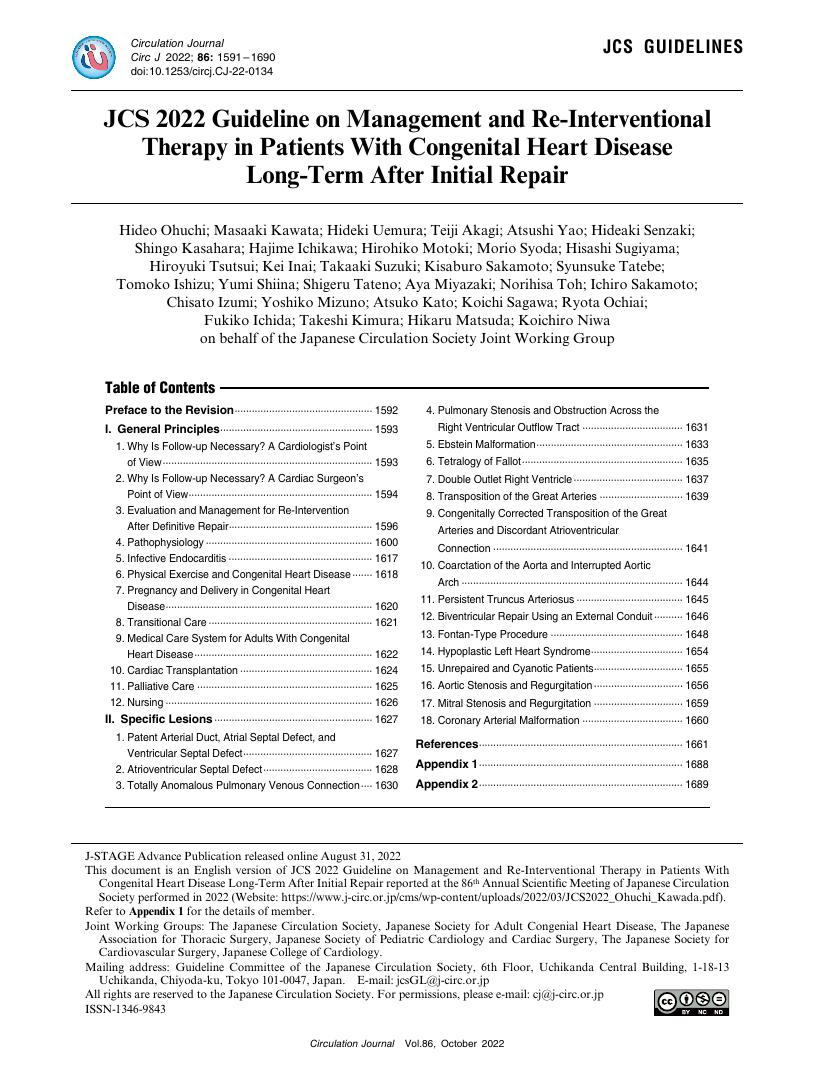- 著者
- Hideo Ohuchi Masaaki Kawata Hideki Uemura Teiji Akagi Atsushi Yao Hideaki Senzaki Shingo Kasahara Hajime Ichikawa Hirohiko Motoki Morio Syoda Hisashi Sugiyama Hiroyuki Tsutsui Kei Inai Takaaki Suzuki Kisaburo Sakamoto Syunsuke Tatebe Tomoko Ishizu Yumi Shiina Shigeru Tateno Aya Miyazaki Norihisa Toh Ichiro Sakamoto Chisato Izumi Yoshiko Mizuno Atsuko Kato Koichi Sagawa Ryota Ochiai Fukiko Ichida Takeshi Kimura Hikaru Matsuda Koichiro Niwa on behalf of the Japanese Circulation Society Joint Working Group
- 出版者
- The Japanese Circulation Society
- 雑誌
- Circulation Journal (ISSN:13469843)
- 巻号頁・発行日
- pp.CJ-22-0134, (Released:2022-08-31)
- 参考文献数
- 1071
- 被引用文献数
- 6
- 著者
- Shunsuke Tatebe Satoshi Yasuda Ryo Konno Yasuhiko Sakata Koichiro Sugimura Kimio Satoh Takashi Shiroto Satoshi Miyata Osamu Adachi Masato Kimura Yoshiko Mizuno Junko Enomoto Shigeru Tateno Hiromichi Nakajima Kotaro Oyama Yoshikatsu Saiki Hiroaki Shimokawa
- 出版者
- The Japanese Circulation Society
- 雑誌
- Circulation Journal (ISSN:13469843)
- 巻号頁・発行日
- pp.CJ-23-0383, (Released:2023-09-05)
- 参考文献数
- 37
- 被引用文献数
- 2
Background: Little is known about clinical or sociodemographic factors that influence health-related quality of life (HRQoL) in patients with adult congenital heart disease (ACHD).Methods and Results: We conducted a nationwide prospective cross-sectional multicenter study at 4 large ACHD centers in Japan. From November 2016 to June 2018, we enrolled 1,223 ACHD patients; 1,025 patients had an HRQoL score. Patients completed a questionnaire survey, including sociodemographic characteristics, and the 36-Item Short-Form Health Survey (SF-36). To determine factors associated with HRQoL, correlations between 2 SF-36 summary scores (i.e., physical component score [PCS] and mental component score [MCS]) and other clinical or sociodemographic variables were examined using linear regression analysis. In multivariable analysis, poorer PCS was significantly associated with 11 variables, including older age, higher New York Heart Association class, previous cerebral infarction, being unemployed, and limited participation in physical education classes and sports clubs. Poorer MCS was associated with congenital heart disease of great complexity, being part of a non-sports club, current smoking, and social drinking. Student status and a higher number of family members were positively correlated with MCS.Conclusions: This study demonstrates that HRQoL in ACHD patients is associated with various clinical and sociodemographic factors. Further studies are needed to clarify whether some of these factors could be targets for future intervention programs to improve HRQoL outcomes.
- 著者
- Hideo Ohuchi Masaaki Kawata Hideki Uemura Teiji Akagi Atsushi Yao Hideaki Senzaki Shingo Kasahara Hajime Ichikawa Hirohiko Motoki Morio Syoda Hisashi Sugiyama Hiroyuki Tsutsui Kei Inai Takaaki Suzuki Kisaburo Sakamoto Syunsuke Tatebe Tomoko Ishizu Yumi Shiina Shigeru Tateno Aya Miyazaki Norihisa Toh Ichiro Sakamoto Chisato Izumi Yoshiko Mizuno Atsuko Kato Koichi Sagawa Ryota Ochiai Fukiko Ichida Takeshi Kimura Hikaru Matsuda Koichiro Niwa on behalf of the Japanese Circulation Society Joint Working Group
- 出版者
- The Japanese Circulation Society
- 雑誌
- Circulation Journal (ISSN:13469843)
- 巻号頁・発行日
- vol.86, no.10, pp.1591-1690, 2022-09-22 (Released:2022-09-22)
- 参考文献数
- 1071
- 被引用文献数
- 6
- 著者
- Hidetaka Itoh Hidehiro Kaneko Hiroyuki Kiriyama Yuriko Yoshida Koki Nakanishi Yoshiko Mizuno Masao Daimon Hiroyuki Morita Yutaka Yatomi Nobutake Yamamichi Issei Komuro
- 出版者
- Japan Atherosclerosis Society
- 雑誌
- Journal of Atherosclerosis and Thrombosis (ISSN:13403478)
- 巻号頁・発行日
- pp.48728, (Released:2019-06-22)
- 参考文献数
- 40
- 被引用文献数
- 23
Aim: Obesity and metabolic syndrome (MetS) frequently coexist and are both important risk factors for cardiovascular disease. However, the pathophysiological role of obesity without MetS, also referred to as metabolically healthy obesity (MHO), remains unclear. In this study, we aim to clarify the effect of MHO on the development of carotid plaque using a community-based cohort.Methods: We examined 1,241 subjects who underwent health checkups at our institute. Obesity was defined by a body mass index of ≥ 25.0 kg/m2. Subjects were divided into three groups: non-obese, MHO, and metabolically unhealthy obesity (MUO).Results: The prevalence of carotid plaque, defined as intima-media thickness (IMT) ≥ 1.1 mm, was higher in subjects with MUO and MHO than in non-obese subjects. Multivariable analysis demonstrated that MHO (odds ratio 1.6, p=0.012) and MUO (odds ratio 1.9, p=0.003) as well as age of ≥ 65 years, male sex, hypertension, and diabetes mellitus were independently associated with carotid plaque formation. A similar trend was observed in each subgroup according to age and sex.Conclusions: MHO increased the prevalence of carotid plaque when compared with non-obese subjects, suggesting the potential significance of MHO in the development of subsequent cardiovascular diseases.
